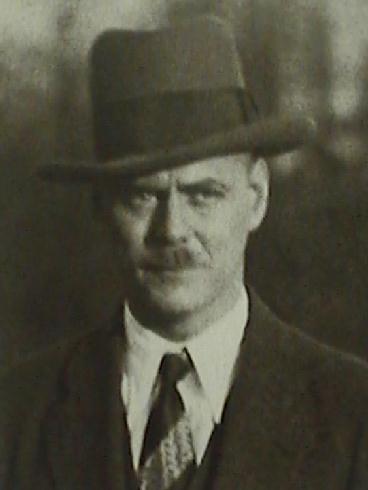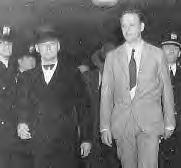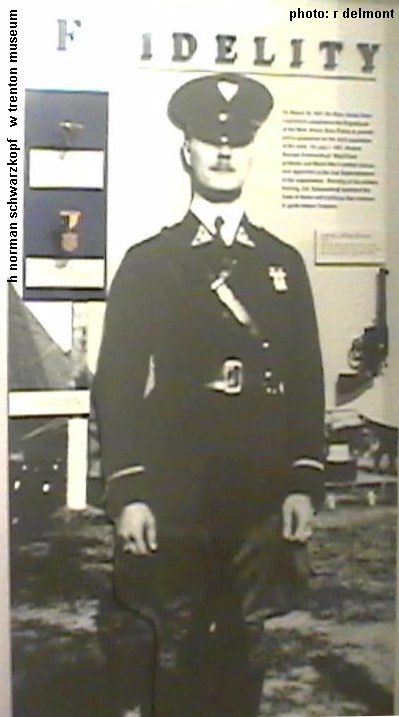
The Lindbergh Kidnapping - A Hoax?
H. Norman Schwarzkopf - Police Chief

WEBSITE
DIRECTORY ![]() SEARCH
THIS WEBSITE
SEARCH
THIS WEBSITE ![]() DONATE
with PAYPAL
DONATE
with PAYPAL
![]() SOURCES
SOURCES
by Judge W Dennis Duggan, JFC
reprinted from The Albany County Bar Association Newsletter 01/04
![]() How
did Lindbergh steal the case?
How
did Lindbergh steal the case?
![]() Wiretapping
by Meyer Berger 1936
(PDF)
Wiretapping
by Meyer Berger 1936
(PDF)
![]() Corporal
Wolf Initial Report March 1, 1932
(PDF)
Corporal
Wolf Initial Report March 1, 1932
(PDF)
![]() H
Norman Schwarzkopf & NJ State Trooper History (1928)
H
Norman Schwarzkopf & NJ State Trooper History (1928)
![]() Freedom of Information Act - 1368 pages FBI Files
Freedom of Information Act - 1368 pages FBI Files
Charles Lindbergh calmly led the police straight to the window under the baby's nursery and showed them the crude ladder suspected to be the one used in the baby's disappearance. There were two sections of the three-part ladder used to reach the window. One of the ladder rails was split. Lindbergh then pointed out the deep marks in the soft wet earth which were obviously left by the ladder. There was also a footprint beside the marks. Most of the other footprints were destroyed by rain or were trampled upon by reporters and police themselves who never secured the scene of the crime from contamination.
THE ENVELOPE
Lindbergh led the police to the nursery where he pointed out a sealed envelope sitting on the window sill. He ordered the police not to touch the envelope until the fingerprint expert could arrive. However, no one, including Anne or Betty Gow, had ever noticed the envelope before Lindbergh pointed it out. At the trial he could not remember when or how he "discovered" it. Betty Gow and Anne both testified that they never saw the envelope while searching the nursery.
The envelope was finally opened, many hours after the baby's disappearance, (he could have been in China by then!) and the envelope (surprise!) contained an anonymous ransom note. It contained a coded symbol as the only signature. The body of the note claimed that the Lindbergh baby was being held for $50,000. It never occurred to anyone that this was a pitifully small amount for the most famous baby in the world!
Ironically, Sgt. Kelly found no fingerprints on the envelope or the ransom note. But, more surprisingly, no fingerprints were found anywhere in the room! No prints belonging to the Lindberghs or the child's nurse, even though they had searched the room prior to the arrival of the police. Besides the ransom note, the police found traces of mud on the floor of the baby's nursery. Also, no blood stains were ever found anywhere in the nursery.
Lindbergh refused to allow police to interview any of his household employees. Eventually the police would question and investigate all household and estate employees. Lindbergh also rejected the assistance of the FBI. Instead, he hired
Morris (Mickey) Rosner, a minor member of the underworld, to help him in his "search."
Sept 16, 1999
New Jersey Star Ledger
COLLEGE PARK, Md. -- It was two days after the infant son of aviator Charles Lindbergh been found dead in the woods near Hopewell, and FBI Director J. Edgar Hoover had just dispatched a top aide to New Jersey to help in the investigation.
In his first report back to his boss in Washington, Special Agent F.X. Fay expressed dismay at the investigative prowess of the New Jersey State Police. The investigation, he told Hoover, was a mess.
"I believe --in fact, I know -- that if we could step in right now and take over the entire investigation, we would save both time and money and accomplish much better results," Fay said.
The FBI agents weren't the only ones to criticize the State Police probe of the 1932 abduction and murder that has been called "the Crime of the Century." A New Jersey governor, Harold Hoffman, local investigators and countless citizens raised questions about the investigation that led to the conviction and execution of German immigrant Bruno Richard Hauptmann in 1936, according to thousands of FBI files on the case that were released at the National Archives yesterday.
Hauptmann was convicted of using a homemade ladder to break into the second-story nursery at the Lindbergh estate in Hopewell on March 1, 1932, abducting the baby, killing him and leaving the body in a shallow grave a few miles from the house. Hauptmann was arrested after spending some of the ransom money. He was tried in Flemington, found guilty and executed in Trenton State Prison.
Many of the 28,000 documents had been released by the FBI over the years, but yesterday was the first time the original, unedited papers were made public. For researchers, there were few surprises, but the files opened a window into the strained relations between Hoover and the New Jersey investigators.
In the boxed papers were hundreds of yellowed, tattered letters from citizens who volunteered their help, fingered associates or devised their own theories on the crime. Also offering their services: self-confessed rum runners, convicted gangsters and other shadowy underworld characters.
There are also dozens of aged black-and-white photos of Hauptmann, a carpenter, his modest home in the Bronx and the crime scene, along with newspaper clippings and copies of some of the $50,000 in gold certificates that paid the ransom.
Also among the mountains of papers was the FBI original draft of a news release announcing the arrest of Hauptmann on Sept. 19, 1934, saying that "after continued and vigorous questioning, Hauptmann admitted his participation in the kidnapping." That paragraph was crossed out in pencil, with a handwritten note "Please delete."
The files show that Hoover personally oversaw the FBI's involvement in the case and at times took steps to keep state investigators in the dark about what his G-men were up to.
Still, Hoover acknowledged that the case fell solely to the jurisdiction of the 11-year-old New Jersey State Police, headed by Col. H. Norman Schwarzkopf, and there was little he could do to influence it.
Agent Fay arrived at Trenton's Hotel Hildebrecht on May 17, 1932. The next day, he wrote to Hoover that the investigation, headquartered in the garage at the Lindbergh estate, was in disarray. He described Schwarzkopf as "childish" and a press hound who was more interested in headlines that solving the crime.
"Schwarzkopf seems to be very much interested in the publicity which he is receiving. . . . He does not seem to give much thought to the answers which he makes and the information given to the press," Fay wrote.
"Unless he is very fortunate and actually falls across the solution to this case, I feel that his press reports will eventually act as a boomerang to him," the letter continued.
"I have not seen a man who has impressed me as being a real investigator engaged on this case so far. They have their own staff, members of the Jersey City Police and a couple of Newark detectives. They appear to be of the hit or miss variety and seem to be using police methods (strong arm) entirely,'" Fay wrote.
Hoover, on May 18, 1932, wrote Schwarzkopf to suggest that the State Police leader tone down the publicity, particularly when it came to the federal involvement in the case.
In a memo dated Sept. 18, 1934, the day before Hauptmann was arrested, Hoover shifted the assignments of several agents in an apparent effort to keep their identities a secret from New Jersey and New York City investigators in the case.
"Extreme care should be exercised in order that officials of the New Jersey State Police and New York City Police will not be advised of the identity of these agents or the fact that they are working on the Lindbergh case," Hoover wrote, adding that the new agents should keep their assignment secret even from other agents in the bureau's New York office.
In a separate memo that same day, Hoover ordered the New York office to "discontinue immediately the practice of furnishing to the New Jersey State Police copies of investigative reports."
Still, from the beginning, Hoover went to some lengths to keep the bureau from being seen as taking over control of the investigation from local authorities.
"I have impressed upon (a subordinate) the imperative desire of approaching a situation at Trenton in an extremely diplomatic manner and to at the same time see that no impression is gained that the federal authorities . . . intend to assume direction of the state investigation," Hoover wrote in a memo May 17, 1932.
The files also contained some evidence that the State Police felt no love for the FBI. One top aide to Schwarzkopf, Maj. Charles Schoeffel, alleged during a crime conference in North Jersey that Hoover had urged one of his agents to lie in testimony at Hauptmann's trial.
Hoover expressed outrage in a Jan. 20, 1936, letter to Schwarzkopf. In the letter, Hoover denied instructing Special Agent T.H. Sisk to lie in his testimony at Hauptmann's trial.
"I, of course, am not even remotely interested in any insinuations or statements made by Major Schoeffel concerning my tenure in office, but I naturally resent the serious allegations that I in any manner induced a special agent of this bureau to commit perjury," Hoover wrote.
In an earlier memo to an FBI underling, dated Dec. 23, 1934, Hoover said Schwarzkopf informed him that Hauptmann's lawyer, Edward J. Reilly, intended to subpoena Hoover to testify in the case.
"Reilly wants me to testify that the division had to come to the aid of the State Police in order to save the case, and that the case was so badly bungled that none of the evidence is authentic," Hoover wrote.
Governor Hoffman, whose political career was ruined by his attacks on the state's handling of the case, went to great lengths to convince Hoover of the need for continued investigation even after Hauptmann was arrested.
During a secret midnight meeting in Hoover's suite at the Hotel New Yorker on Jan. 18, 1936, Hoffman said he believed Hauptmann did not act alone. The Republican governor followed up the meeting with a letter seeking continued FBI action.
"There is evidence, abundant evidence that other persons participated in the crime, and there is absolutely no reason why our law enforcement agencies should regard this case as closed," he wrote.
Long after Hauptmann's execution, the case obsessed Americans. They showered the FBI with letters, offering fresh conspiracy theories, accused people they considered suspicious, and described supposed sightings of the baby.
Others thought they had stumbled onto the ransom money and submitted serial numbers of bills.
In 1951, one man called Hoover directly to report that Princeton professor Albert Einstein had framed Hauptmann.
Ten or so years later, a postman in Kingston, Jamaica, contacted the bureau to report that two local men he had been spying on for 12 years were surely involved in the crime.
No matter how ludicrous their claims appeared, the informants were dead serious.
"This may just be wasting your time; but I have been very suspicious for a few years here," a Brooklyn woman wrote anonymously in 1941. "This man's name is Fred or Dutch Schultz. He has two boys both seem about the same age . . . and (one) is the image of the Lindbergh baby blue eyes blond curly hair."
A Mrs. Starks from Kentucky contacted the bureau to put in her two cents: "You may think it foolish for me to burst out like this after so long a time but I tell you I have never believed the Lindenburg baby is dead," she began.
She went on to relate that, at the time of the kidnapping, she noticed a couple with a traveling carnival who had a baby that looked just like the missing child. She told Hoover that she wrote Lindbergh himself to tell him this, but that he never answered.
"I don't trust Lindenburg any further than I do Hitler," she wrote. "I do think he should be watched closely."
In 1945 a former New York state prison inmate informed the FBI that he had met a fellow in prison who claimed to have participated in the kidnapping. According to his former prison pal, the baby was immediately smothered, and the mastermind was a man named Lombardi from Boston.
During World War II, a Staten Island-based group called "The Lindbergh Witnesses" circulated a pamphlet blaming the Japanese.
And in 1945, E.D. Williams of West Hempstead, N.Y., wrote Hoover that the FBI should re-examine the case in light of the war's end. "Pipe dream or not, it has always been my idea that the kidnapping was organized and directed by the Nazi Party from Germany."
The FBI held many of the letter-writers in very low esteem, branding them "nuts" or "wacky." One agent referred to a former Marine volunteering information as "psychopathic."
Passage of time did not bring down the fever of those obsessed with the crime.
In 1948, the FBI director received a teletype from an agent who had just been contacted by the chief of the South Plainfield Police Department. Apparently a couple who lived in the Middlesex County borough had their dining room table repaired and found "hidden German writing in pencil" containing directions to some of the ransom money.
thanks to Mark Falzini for this article
FAITH
TO LINDY SEALED MY LIPS --- SCHWARZKOPF
(Source: New York Evening Journal. February 16, 1935)
By Sid Boehm
Trenton, Feb 15. Three years ago standing in the Lindbergh house on Sourland
Mountain, Col. H. Norman Schwarzkopf, head of the New Jersey State Police, saw
for the first time the tragedy and sorrow of a mother and father robbed of their
only child.
For almost three years he has silently shouldered the blame for the unsuccessful
search for the kidnapper and murderer of the Lindbergh baby. He allowed the trail to grow cold, it was charged: he had stood by idly while
the kidnapper collected $50,000.
COLD TO ACCLAIM
Today, Colonel Schwarzkopf shares the acclaim of the world with Attorney General
David T. Wilentz. This fame and fanfare pleases him only mildly, for he explains
that tomorrow, when it comes, may see the 'fickle public' once more veering from
admiration to scorn.
Since that eventful night of March 1 many have wondered why he, known to his men
and thousands of New Jersey farmers as a fighter, had remained silent to the
harsh criticism leveled at him.
With the conviction of Bruno Richard Hauptmann tabulated into the records, the
Evening Journal correspondent sought explanation of why he had stood mutely by
and permitted other police heads to cast the responsibility for failure into his
hands. What did he gain when he allowed them to rob him of credit for the conviction
and confession of John Hughes Curtis.
'GAINED FRIEND'

'I have gained a friend,' he explained. 'There is nothing I wouldn't do for
Colonel Lindbergh -- there is no oath that I wouldn't break if it would
materially help his well being. There is not a single man in my outfit who
wouldn't lay down his life for Col. Lindbergh.'
Hundreds of unopened telegrams of congratulations lay heaped on his desk at
headquarters as he told why he had not gone ahead with the search for the
kidnaper until after the baby's body was found and it was apparent that Colonel
Lindbergh had been tricked.
'I admit that there wasn't one single important step taken by us,' he said,
'until we consulted Colonel Lindbergh to learn if we would be interfering with
his chances of getting back the baby. Of course, when the child was found, we
knew we had waited vainly.
'We knew that the ransom money would be paid on the night of April 2, 1932, but
we did not make any official or unofficial move to trail the collector of that
money. We stayed clear of that cemetery. 'Of course, by the time the child was found the trail had grown cold, but my men
picked it up again and I proudly admit that our part was the vital one toward
bringing this crime to a solution.
'I have never regretted my decision on the night of the kidnaping when I felt
that the child must be found and that we should do nothing official to hinder
that possibility.
'Colonel Lindbergh is the finest man I have ever know.' [sic]
The great flier would never have been a daily spectator at the trial in
Flemington had not Colonel Schwarzkopf requested it. This has been admitted by
the prosecuting authorities. It was Colonel Lindbergh's clean bill of health for
his friend, they pointed out.

SHOWED FAITH
It was his final expression of faith in the New Jersey police -- faith that they
had done their jobs and
apprehended the right man. This was the second time Colonel Lindbergh had acted for his friend.
More than two years ago when Violet Sharpe [sic], Morrow household servant, had committed suicide,
the public cry had gone out that Schwarzkopf was 'responsible.' She had
been 'third degreed' to her death, they clamored.
It was then that the flying Colonel stilled the shouts with a statement clearing
Schwarzkopf and explaining that he, himself, had been present during the Sharpe [sic] girl's questioning.
![]() Ronelle Delmont's
Lindbergh Kidnapping Hoax
You Tube Channel
Ronelle Delmont's
Lindbergh Kidnapping Hoax
You Tube Channel
![]() Michael
Melsky's
Lindbergh Kidnapping Discussion Board
Michael
Melsky's
Lindbergh Kidnapping Discussion Board
WEBSITE
DIRECTORY ![]() SEARCH
THIS WEBSITE
SEARCH
THIS WEBSITE ![]() DONATE
with PAYPAL
DONATE
with PAYPAL
![]() SOURCES
SOURCES
© Copyright Lindbergh Kidnapping Hoax 1998 - 2025